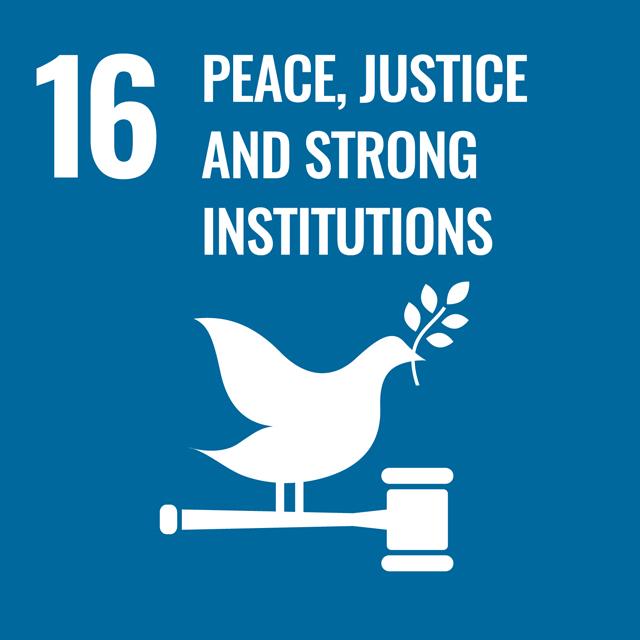
Our goals in action
Research and innovation
Contributing to global peace
Queen's researcher John McGarry was awarded the 2022 Pearson Peace Medal in recognition of his outstanding contributions to peace and prosperity around the world. One of the world's foremost experts in conflict resolution, Dr. McGarry was appointed the United Nations' first Senior Advisor on Power-Sharing is an ongoing member of the United Nations' Mediation Roster, with his foundational works on Northern Ireland being influential in its 1998 Good Friday Peace Agreement.
![[Dr. John McGarry stands in front of a Trident Sun jet at the Nicosia airport in Cyprus. ]](/social-impact/sites/sdgwww/files/uploaded_images/2022-2023/Figure%2016.1_750x500.jpeg)
Research expertise
The Institute of Intergovernmental Relations is Canada’s premier university-based centre for research on federalism and intergovernmental relations, both in Canada and in countries around the world.
Research that shapes public policy
The John Deutsch Institute for the Study of Economic Policy in the Department of Economics informs policymaking in Canada and abroad by focusing on policy-relevant research in economics and related fields.
Teaching and student life
Educating current and future leaders
The one-year, multidisciplinary Master of Public Administration (MPA) program has been preparing full-time students to enter leadership roles in public service and policymaking for more than 35 years.
Queen's Graduate Diploma in Immigration and Citizenship Law is Canada's only English-language pathway to becoming a licensed immigration consultant. The program will train the next generation of immigration consultants in the full range of competencies, from immigration and citizenship law to best practices for career success.
The online Certificate in Organized Crime Prevention Foundations at Queen's provides vital knowledge and skills to identify, analyze, and mitigate criminal activity. The program is designed to provide a foundational knowledge of organized crime prevention for law enforcement and government agents, and people interested in having a better understanding of the impact of organized crime on their everyday lives.
![[Line drawing of a court house and the number >1000]](/social-impact/sites/sdgwww/files/img/statistic/over-1000.png)
More than 1,000 alumni from the Professional Master of Public Administration (PMPA) have gone on to senior roles at all levels of government.
Student representation and leadership
The Alma Mater Society of Queen’s University (AMS), as our student government is called, is one of our university's key distinguishing factors. The AMS is responsible for many of the services and opportunities available on campus and represents the needs of the students to university administration.
![[Queen's Bands perform ahead of a football game]](/social-impact/sites/sdgwww/files/uploaded_images/2021-2022/Queen%27s%20Bands_750x500.jpg)
Queen's Model Parliament (QMP) is the oldest and largest model parliament in Canada. A student-led event that attracts upwards of 100 Queen's students from across all faculties, QMP is held in Canada's House of Commons where students experience the legislative process by forming political parties, running for government, drafting bills, and debating these bills on the floor.
![[Line drawing of a Queen's tam]](/social-impact/sites/sdgwww/files/img/statistic/queens-ams.png)
The Alma Mater Society of Queen’s University (AMS) is Canada’s oldest undergraduate student government.
Community impact
Forging a partnership
Queen’s University is located on traditional Anishinaabe and Haudenosaunee Territory, in the heart of Kingston, Ontario. The university’s impact in the local community and beyond is felt across a range of dimensions: economically, socially, and culturally. This impact happens when Queen’s works intentionally with community partners to advance wellbeing, bring innovations to market, and build a stronger community. The Economic and Community Impact Study of Queen’s University prepared by Deloitte reports on our impact to the region’s economy, as well as the many tangible impacts to the quality of life in the community that cannot be expressed in strictly economic terms.
Serving our community
Queen’s Legal Aid provides a wide range of free legal services, including attending courts and tribunals, to low-income residents of Kingston, Napanee, and surrounding areas, and to Queen’s University students. From Criminal Court to Small Claims Court, and from hearings before the Social Benefits Tribunal, the Human Rights Tribunal of Ontario, and the Landlord and Tenant Board, Queen’s Legal Aid is able to provide excellent representation to eligible clients.
Global reach
Supporting those affected by war, conflict, and political instability
The Principal’s Global Scholars and Fellows Program offers support through sanctuary and assistance for students, postdoctoral fellows, and faculty members forcibly displaced by conflict, political instability, violence, and persecution.
Queen’s is a member of Scholars at Risk (SAR), an international network of institutions and individuals working to protect scholars facing threats to their lives, liberty, and wellbeing. Our SAR Committee oversees the implementation of SAR activities with the purpose of ensuring consistency, transparency, and quality of its activities while fostering an environment of global cosmopolitanism, and global citizenship at Queen’s that protects and encourages academic freedom. Initiatives include hosting an Artist Protection Fund Fellow at Queen's with support of the Artist Protection Fund and a generous donation from alumni.
Administration and operations
![[Photo of Richardson Hall]](/social-impact/sites/sdgwww/files/img/GB_Richardson_door-5.jpg)
University governance measures
The Queen’s Board of Trustees is the university’s highest governing body and is responsible for the overall operations of the university. It includes elected representation from undergraduate and graduate students, faculty, and staff.
Diversity at the university’s highest levels
The Board of Trustees’ Diversity, Equity, Inclusion, and Indigenization Action Plan instructs the Board to consider Diversity and Inclusion in its own composition and that of its working groups. It also requires the consideration of diversity in all its mandates and policies.
Commitment to free speech
Queen’s Free Expression Policy protects free speech on campus. It includes the right of any person, group, or community to communicate opinions and ideas without interference, censorship, or sanction, including the right to engage in peaceful protest about the content of the free expression of others.